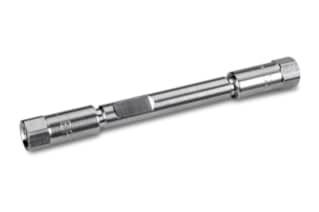
|
Chemistry |
HILIC |
|
Separation Mode |
Hydrophilic Interaction (HILIC) |
|
Particle Substrate |
Silica |
|
pH Range Min |
1 pH |
|
pH Range Max |
5 pH |
|
Maximum Pressure |
6000 psi (415 Bar) |
|
Endcapped |
No |
|
Silanol Activity |
High |
|
Particle Shape |
Spherical |
|
Particle Size |
3 µm |
|
Endfitting Type |
Waters |
|
Pore Size |
100 Å |
|
Format |
Column |
|
Surface Area |
330 |
|
System |
HPLC |
|
Particle Technology |
Silica |
|
USP Classification |
L3 |
|
Inner Diameter |
2.1 mm |
|
Length |
50 mm |
|
UNSPSC |
41115709 |
|
Brand |
Atlantis |
|
Product Type |
Columns |
|
Units per Package |
1 pk |
Atlantis Silica HILIC Column, 100Å, 3 µm, 2.1 mm X 50 mm, 1/pk
Use the Atlantis Silica HILIC Column to easily separate and retain very polar, water-soluble basic organic compounds using Hydrophilic Interaction Chromatography. These compounds include peptides, metabolites, and actives. Other than retaining very polar compounds, HILIC offers improved LC/ESI-MS response and direct compatibility with SPE solvents. Compared to reversed-phase HPLC, it also offers complementary selectivity.
The retention and separation of very basic polar analytes is extremely difficult using reversed-phase chromatography. This is due to their hydrophilic nature combined with their net positive charge at acidic pH. HILIC resolves these challenging separation problems which is why the Atlantis Silica HILIC Column is the ideal lab equipment for use in metabolism, drug discovery, and combinatorial chemistries.
Using the Atlantis Silica HILIC Column, you can retain highly polar basic analytes with volatile mobile phases that are suitable for compound ionization by ESI-MS. This means you get results that exhibit higher sensitivity and lower limits of detection. This is especially useful in drug metabolism studies as metabolites are often more polar than their parent compounds and are present in a much lower concentration.
You may also want to get the Atlantis Silica HILIC VanGuard Cartridge, 100Å, 3 µm, 2.1 mm X 5 mm, 3/pk. Designed to work especially with the Atlantis Silica HILIC Column, the VanGuard Cartridge ensures that your analytical column is safe from particulate and chemical contaminants. This, in turn, means that the column lifetime is lengthened and you do not need to invest in more lab equipment as the column repeatedly gives excellent results.
Shop for lab equipment by browsing through our range of available products in our catalog which contains related products, variations of the same product, and contact and ordering information.
What Injection Solvents Are Recommended For HILIC?
It is recommended that water be eliminated or if necessary, its use be minimized. 100% organic solvents should be aimed for use with the Atlantis Silica HILIC Column. Use weak HILIC solvents such as acetonitrile, isopropanol, methanol etc. A good compromise between peak shape and analyte solubility is the generic injection solvent, the 75:25 acetonitrile methanol. To avoid poor peak shapes, avoid using water and dimethylsulfoxide (DMSO). Replace water or DMSO with acetonitrile by using reversed-phase solid-phase extraction. If this is not feasible, dilute the water or DMSO with organic solvent.